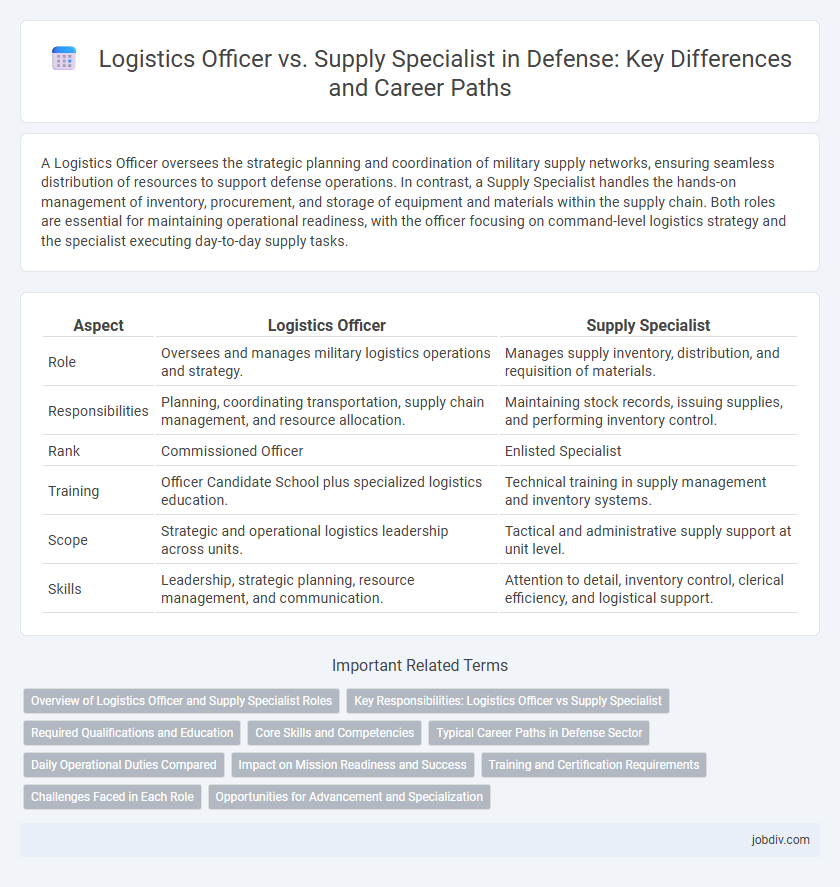A Logistics Officer oversees the strategic planning and coordination of military supply networks, ensuring seamless distribution of resources to support defense operations. In contrast, a Supply Specialist handles the hands-on management of inventory, procurement, and storage of equipment and materials within the supply chain. Both roles are essential for maintaining operational readiness, with the officer focusing on command-level logistics strategy and the specialist executing day-to-day supply tasks.
Table of Comparison
| Aspect | Logistics Officer | Supply Specialist |
|---|---|---|
| Role | Oversees and manages military logistics operations and strategy. | Manages supply inventory, distribution, and requisition of materials. |
| Responsibilities | Planning, coordinating transportation, supply chain management, and resource allocation. | Maintaining stock records, issuing supplies, and performing inventory control. |
| Rank | Commissioned Officer | Enlisted Specialist |
| Training | Officer Candidate School plus specialized logistics education. | Technical training in supply management and inventory systems. |
| Scope | Strategic and operational logistics leadership across units. | Tactical and administrative supply support at unit level. |
| Skills | Leadership, strategic planning, resource management, and communication. | Attention to detail, inventory control, clerical efficiency, and logistical support. |
Overview of Logistics Officer and Supply Specialist Roles
Logistics Officers manage the planning, coordination, and execution of complex supply chains, ensuring the timely delivery of materials and equipment critical to military operations. Supply Specialists focus on inventory management, procurement, and distribution of supplies, maintaining accurate records and handling storage and issue of essential items. Both roles are vital for operational readiness, with Logistics Officers overseeing broader strategic logistics and Supply Specialists handling detailed supply chain execution.
Key Responsibilities: Logistics Officer vs Supply Specialist
Logistics Officers oversee the planning, coordination, and execution of supply chain operations, ensuring timely delivery of materials and resources critical to mission success. Supply Specialists manage inventory control, storage, and distribution of equipment and supplies, maintaining accurate records and accountability. Both roles are essential for maintaining operational readiness, with Logistics Officers focusing on strategic logistics management and Supply Specialists handling tactical supply functions.
Required Qualifications and Education
A Logistics Officer typically requires a bachelor's degree in logistics, business administration, or a related field, along with leadership experience and knowledge of supply chain management principles. Supply Specialists often need a high school diploma or equivalent, with on-the-job training and certification in inventory control, procurement, and distribution. Both roles demand strong organizational skills and proficiency in logistics software, but officers usually possess advanced qualifications for strategic planning and management responsibilities.
Core Skills and Competencies
Logistics Officers excel in strategic planning, resource allocation, and operational coordination to ensure mission readiness and efficiency. Supply Specialists specialize in inventory management, equipment distribution, and supply chain tracking, maintaining accurate records and accountability. Both roles require strong organizational skills, attention to detail, and familiarity with military supply systems, but Logistics Officers focus more on leadership and overarching logistics strategies while Supply Specialists handle hands-on supply operations.
Typical Career Paths in Defense Sector
Logistics Officers in the defense sector typically advance through roles involving operational planning, resource management, and strategic coordination, often moving into leadership positions within logistics units or joint command centers. Supply Specialists focus on inventory control, procurement, and distribution of military supplies, frequently progressing to senior supervisory roles in supply chain management or warehouse operations. Both career paths offer specialization in defense logistics, but Logistics Officers generally pursue broader command responsibilities while Supply Specialists concentrate on efficient material support.
Daily Operational Duties Compared
A Logistics Officer coordinates the planning, movement, and maintenance of military resources, ensuring seamless operational support across multiple units. A Supply Specialist manages inventory control, procurement, and distribution of equipment and materials at a tactical level, maintaining accurate stock records and requisitioning supplies as needed. While Logistics Officers oversee strategic logistical frameworks, Supply Specialists execute the hands-on processes critical for daily mission readiness.
Impact on Mission Readiness and Success
Logistics Officers coordinate strategic planning and resource allocation, directly enhancing mission readiness by ensuring timely deployment of personnel, equipment, and supplies. Supply Specialists manage inventory control and distribution, maintaining critical stock levels that prevent operational delays. Together, their roles optimize supply chain efficiency, significantly contributing to mission success through sustained logistical support.
Training and Certification Requirements
Logistics Officers require comprehensive military leadership training and typically hold certifications such as the Defense Acquisition Workforce Improvement Act (DAWIA) levels or Certified Logistics Professional credentials. Supply Specialists focus on technical training related to inventory management, transportation, and supply chain operations, often obtaining certifications like the Certified Supply Chain Professional (CSCP) or Department of Defense Logistics Management certifications. Both roles demand ongoing professional development to maintain operational readiness and meet evolving defense logistics standards.
Challenges Faced in Each Role
Logistics Officers face challenges in strategic planning and coordinating complex supply chains under dynamic operational conditions, requiring real-time decision-making to ensure mission readiness. Supply Specialists encounter difficulties managing inventory accuracy, timely distribution, and equipment maintenance within strict regulatory frameworks and high-demand environments. Both roles demand adaptability and problem-solving skills to overcome disruptions and maintain continuous support to deployed forces.
Opportunities for Advancement and Specialization
Logistics Officers have broader opportunities for advancement into leadership roles such as operations management and strategic planning within military supply chains, leveraging their comprehensive logistics expertise. Supply Specialists primarily advance by deepening their specialization in inventory control, procurement, and material handling, often becoming experts in specific supply categories. Both roles offer distinct pathways: Logistics Officers pursue diverse command and coordination positions, while Supply Specialists focus on technical mastery and supply chain efficiency.
Logistics Officer vs Supply Specialist Infographic

 jobdiv.com
jobdiv.com